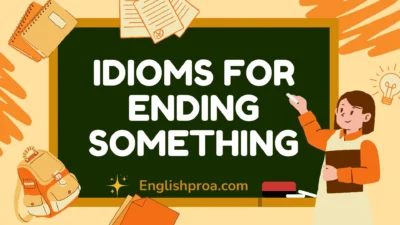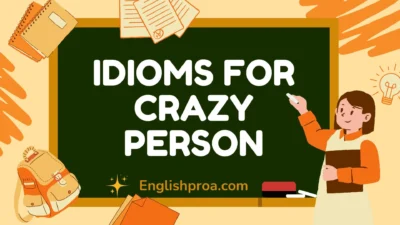We all know someone who can light up a room with just a well-timed joke or a quirky observation. Describing such a person with just “funny” feels too plain, right? That’s where idioms come in handy! They help you express humor and warmth in a clever and colorful way, especially when you’re talking about someone with a sparkling personality or a natural talent for making others laugh.
In this post, I’ll walk you through 30 heartfelt and humorous idioms to describe that funny person in your life, whether it’s a friend, colleague, or loved one. As someone who grew up surrounded by class clowns, witty uncles, and friends who made every moment feel like a comedy sketch, I know how important it is to celebrate their joyful presence with thoughtful expressions.
1. Life of the party
Meaning: A person who brings energy and humor to social gatherings.
In a sentence: Jake is always the life of the party, making everyone laugh till their cheeks hurt.
Best use: Perfect when describing someone socially charismatic.
Not use: Don’t use for someone who’s funny but shy or introverted.
Other ways to say: Social butterfly, entertainer, attention grabber
2. Crack a joke
Meaning: To tell a joke to make people laugh.
In a sentence: She’s the type to crack a joke even during a serious meeting.
Best use: When someone is casually making others laugh.
Not use: Avoid using for professional comedians or scripted humor.
Other ways to say: Make a wisecrack, drop a line, pull a funny
3. Laugh a minute
Meaning: Someone who is constantly funny or entertaining.
In a sentence: Hanging out with Rob is a laugh a minute.
Best use: Great for fun-loving, constantly joking friends.
Not use: Don’t use for someone with dry or subtle humor.
Other ways to say: Hilarious, always cracking jokes, nonstop fun
4. Have a quick wit
Meaning: Be able to make clever or funny remarks instantly.
In a sentence: Emily has such a quick wit, you never see her comebacks coming.
Best use: Best for clever, fast-talking people.
Not use: Not ideal for physical or silly humor types.
Other ways to say: Sharp-tongued, snappy, witty
5. Class clown
Meaning: Someone who constantly jokes around in a group, especially in school.
In a sentence: He’s been the class clown since elementary school.
Best use: Works well in informal, school-based, or playful settings.
Not use: Avoid for more mature or professional contexts.
Other ways to say: Joker, prankster, goofball
6. Barrel of laughs
Meaning: Someone or something very funny or entertaining.
In a sentence: That vacation was a barrel of laughs, thanks to Mia’s antics.
Best use: Great for describing fun experiences or people.
Not use: Not appropriate in serious or solemn situations.
Other ways to say: Riot, hoot, hilarious company
7. Cut up
Meaning: A person who’s always joking or clowning around.
In a sentence: Mark’s such a cut up, he had us in tears of laughter.
Best use: Perfect for informal conversations.
Not use: Avoid in formal writing or settings.
Other ways to say: Comedian, joker, goof
8. Laugh your head off
Meaning: Laugh uncontrollably.
In a sentence: We laughed our heads off at her impressions.
Best use: Good for describing reaction to something funny.
Not use: Don’t use to describe the person directly.
Other ways to say: Burst out laughing, crack up, ROFL
9. Jokester
Meaning: Someone who regularly tells jokes.
In a sentence: My cousin’s a total jokester, always ready with a one-liner.
Best use: Casual, friendly vibe.
Not use: Avoid for professional humorists.
Other ways to say: Tease, clown, humorist
10. Deadpan humor
Meaning: Joking in a dry, expressionless way.
In a sentence: Her deadpan humor catches you off guard every time.
Best use: Great for subtle, intelligent comedians.
Not use: Not for loud or slapstick humor.
Other ways to say: Dry humor, stone-faced jokes, straight-faced comedy
11. Comic relief
Meaning: Someone or something that lightens the mood with humor.
In a sentence: He’s our team’s comic relief during stressful projects.
Best use: In storytelling or workplace banter.
Not use: Avoid if it feels dismissive of their personality.
Other ways to say: Ice-breaker, mood-lifter, tension-easer
12. Be a hoot
Meaning: Be very funny or enjoyable.
In a sentence: Grandma is a hoot when she starts telling stories!
Best use: Works for warm, surprising humor.
Not use: Avoid for sarcastic or edgy humor.
Other ways to say: A riot, hilarious, a gem
13. In stitches
Meaning: Laughing so hard it hurts.
In a sentence: Her stand-up set had us in stitches.
Best use: To describe a funny event or person’s effect.
Not use: Don’t use to describe mild humor.
Other ways to say: Dying laughing, cracking up, laughing like chaotic
14. Stand-up act
Meaning: A funny person who’s as good as a comedian.
In a sentence: He’s like a stand-up act at every family dinner.
Best use: Informal praise of someone’s humor.
Not use: Avoid if the person doesn’t enjoy the attention.
Other ways to say: Comedy star, natural comic, performer
15. Burst out laughing
Meaning: Laugh suddenly and loudly.
In a sentence: We burst out laughing when he showed up in that costume.
Best use: Great for describing group reactions.
Not use: Not specific to describing someone’s character.
Other ways to say: Cackle, chuckle hard, howl with laughter
16. Be a card
Meaning: An amusing, quirky person.
In a sentence: Uncle Joe is such a card, always telling wild stories.
Best use: Warm, affectionate use.
Not use: Avoid in professional contexts.
Other ways to say: Character, original, eccentric
17. Play the fool
Meaning: Pretend to be silly to make others laugh.
In a sentence: He loves to play the fool, even when he’s the smartest one in the room.
Best use: For someone knowingly acting silly.
Not use: Avoid if it could be misread as insulting.
Other ways to say: Clown around, act up, joke about
18. Rolling in the aisles
Meaning: Causing an audience to laugh a lot.
In a sentence: The movie had us rolling in the aisles.
Best use: Describing big group reactions.
Not use: Doesn’t suit personal traits.
Other ways to say: Roaring with laughter, hilarious performance
19. Ham it up
Meaning: Overact or exaggerate for comedic effect.
In a sentence: She really hams it up when telling that story.
Best use: Light-hearted contexts.
Not use: Avoid when sincerity is key.
Other ways to say: Exaggerate, overdo it, showboat
20. Prankster
Meaning: Someone who enjoys playing tricks.
In a sentence: Our office prankster put googly eyes on everything!
Best use: For playful, mischievous types.
Not use: Avoid when humor is not light-hearted.
Other ways to say: Trickster, teaser, joker
21. Gag man/woman
Meaning: Someone known for telling jokes or one-liners.
In a sentence: He’s the go-to gag man at the pub.
Best use: Classic, punchline humor.
Not use: Not for subtle or storytelling humor.
Other ways to say: Joke teller, pun master
22. Be a riot
Meaning: Be very funny or entertaining.
In a sentence: That skit was a riot—I couldn’t stop laughing.
Best use: Slangy and energetic contexts.
Not use: Avoid in formal descriptions.
Other ways to say: Blast, show-stealer, laugh-fest
23. Get the giggles
Meaning: Start laughing uncontrollably.
In a sentence: We got the giggles in the middle of class.
Best use: Playful, childlike scenarios.
Not use: Not for describing someone’s personality.
Other ways to say: Laugh attack, tickled, chuckle fit
24. Be a clown
Meaning: Act silly for humor.
In a sentence: He’s always being a clown during meetings.
Best use: Casual, humorous tone.
Not use: Can be perceived negatively.
Other ways to say: Comic, funny guy, joker
25. Tell a zinger
Meaning: Tell a sharp, clever joke.
In a sentence: She dropped a zinger and had everyone roaring.
Best use: For clever or witty humor.
Not use: Not for long or situational jokes.
Other ways to say: One-liner, punchline, quip
26. Be all jokes
Meaning: Always joking or not taking things seriously.
In a sentence: He’s all jokes, even in serious meetings.
Best use: For playful, cheeky personalities.
Not use: Avoid in sensitive conversations.
Other ways to say: Teasing, always kidding, comic nature
27. Comedic timing
Meaning: Knowing the perfect moment to deliver a joke.
In a sentence: Her comedic timing is spot-on every time.
Best use: Complimenting skill in humor.
Not use: Not for general humor.
Other ways to say: Sense of humor, great delivery, punchline master
28. Funny bone
Meaning: The ability to find things funny or make others laugh.
In a sentence: He really tickles my funny bone.
Best use: For personal, emotional connection to humor.
Not use: Doesn’t work well in third-person storytelling.
Other ways to say: Humor match, laugh connection
29. Be a nut
Meaning: A playful, eccentric, or unpredictable funny person.
In a sentence: Aunt Linda’s a real nut, but we love her for it.
Best use: Warm, familial, or friendly teasing.
Not use: Can be misunderstood if tone isn’t clear.
Other ways to say: Wacky, silly, playful
30. Full of laughs
Meaning: Someone or something that consistently brings joy and humor.
In a sentence: Our weekend road trip was full of laughs.
Best use: Reflecting joyful moments.
Not use: Not ideal for serious or emotional content.
Other ways to say: Laugh-filled, joyful, hilarious experience
FAQs
1. What is a good idiom for someone who’s always joking? “Laugh a minute” or “cut up” are both great for describing someone who’s always bringing humor.
2. Can idioms make my language sound more expressive? Absolutely! Idioms add warmth, character, and emotional texture to your words.
3. Are these idioms suitable for children? Many are! For kids, go with light ones like “class clown” or “get the giggles.”
4. Can I use these idioms in professional writing? Some like “quick wit” or “comic relief” are great for professional contexts. Just be mindful of tone.
5. How do I know which idiom to use? Context is key. Think about the tone you want—playful, respectful, quirky—and choose accordingly.
Conclusion
Talking about someone’s humor is about more than just saying they’re “funny.” These 30 idioms help you connect emotionally, show appreciation for someone’s unique spirit, and share laughter in more expressive ways.
As someone who deeply values humor as a form of human connection, I’ve found that using the right idiom makes moments even more memorable. Whether it’s a friend who lifts your spirits, a colleague with perfect comedic timing, or a relative who’s a riot at every gathering, these idioms will help you celebrate their gift of laughter with heartfelt clarity.





